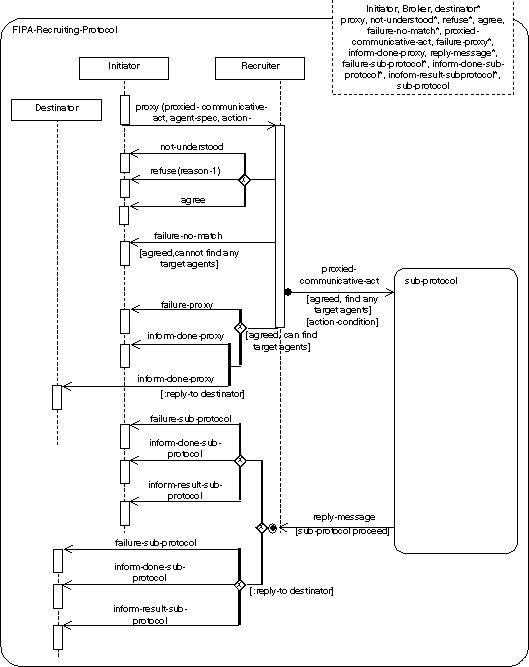FOUNDATION FOR INTELLIGENT
PHYSICAL AGENTS
FIPA Recruiting Interaction Protocol Specification
|
Document title
|
FIPA Recruiting Interaction Protocol Specification
|
|
Document number
|
XC00034F
|
Document source
|
FIPA TC C
|
|
Document status
|
Experimental
|
Date of this status
|
2001/08/10
|
|
Supersedes
|
None
|
|
Contact
|
fab@fipa.org
|
|
Change history
|
|
2001/01/29
|
Approved for Experimental
|
|
2001/08/10
|
Line numbering added
|
© 2000 Foundation for Intelligent Physical Agents - http://www.fipa.org/
Geneva, Switzerland
|
Notice
|
|
Use of the technologies described in this specification may infringe
patents, copyrights or other intellectual property rights of FIPA Members and
non-members. Nothing in this specification should be construed as granting
permission to use any of the technologies described. Anyone planning to make
use of technology covered by the intellectual property rights of others
should first obtain permission from the holder(s) of the rights. FIPA
strongly encourages anyone implementing any part of this specification to
determine first whether part(s) sought to be implemented are covered by the
intellectual property of others, and, if so, to obtain appropriate licenses
or other permission from the holder(s) of such intellectual property prior to
implementation. This specification is subject to change without notice.
Neither FIPA nor any of its Members accept any responsibility whatsoever for
damages or liability, direct or consequential, which may result from the use
of this specification.
|
Foreword
The Foundation for Intelligent Physical Agents
(FIPA) is an international organization that is dedicated to promoting the
industry of intelligent agents by openly developing specifications supporting
interoperability among agents and agent-based applications. This occurs through
open collaboration among its member organizations, which are companies and
universities that are active in the field of agents. FIPA makes the results of
its activities available to all interested parties and intends to contribute
its results to the appropriate formal standards bodies.
The members of FIPA are individually and
collectively committed to open competition in the development of agent-based
applications, services and equipment. Membership in FIPA is open to any corporation
and individual firm, partnership, governmental body or international
organization without restriction. In particular, members are not bound to
implement or use specific agent-based standards, recommendations and FIPA
specifications by virtue of their participation in FIPA.
The FIPA specifications are developed through
direct involvement of the FIPA membership. The status of a specification can be
either Preliminary, Experimental, Standard, Deprecated or Obsolete.More detail about the process of specification
may be found in the FIPA Procedures for Technical Work. A complete overview of
the FIPA specifications and their current status may be found in the FIPA List
of Specifications. A list of terms and abbreviations used in the FIPA
specifications may be found in the FIPA Glossary.
FIPA is a non-profit association registered in
Geneva, Switzerland. As of January 2000, the 56 members of FIPA represented 17countries worldwide. Further
information about FIPA as an organization, membership information, FIPA
specifications and upcoming meetings may be found at http://www.fipa.org/.
Contents
1 FIPA Recruiting Interaction Protocol3
1.1 Exceptions to
Interaction Protocol Flow. 3
2 References. 3
The concept of an information brokerage has
been widely used in mediated systems and in multi-agent systems in particular
(for example, see [Finin97]). The FIPA Recruiting Interaction Protocol (IP) is
designed to support these brokerage interactions in multi-agent systems.
Generally speaking, a broker is an agent
which offers a set of communication facilitation services to other agents using
some knowledge about the requirements and capabilities of those agents. A
typical example of brokering is one in which an agent can request a broker to
find one or more agents who can answer a query. The broker then determines a
set of appropriate agents to which to forward the query, sends the query to
those agents and relays their answers back to the original requestor.
In the case of recruiting, the answers from
the selected target agents go directly back to the original requestor or some
designated receivers. The use of brokerage agents can significantly simplify
the task of interaction with agents in a multi-agent system. Brokering agents
also enable a system to be adaptable and robust in dynamic situations,
supporting scalability and security control at the brokering agent.
The FIPA Recruiting IP is a macro IP,
because the proxy communicative act (see [FIPA00037]) for brokerage
embeds a communicative act as its argument and so the IP for the embedded
communicative act is also embedded in this IP. When the embedded communicative
act includes some actions that would be done by the agents determined by broker
agents, then this IP would be extended for notifying the result of the actions.
The representation of this IP is given in Figure
1.

Figure
1: FIPA Recruiting Interaction Protocol
This IP is a pattern for a simple
interaction type. Elaboration on this pattern will almost certainly be
necessary in order to specify all cases that might occur in an actual agent
interaction. Real world issues of cancelling actions, asynchrony, abnormal or
unexpected IP termination, nested IPs, and the like, are explicitly not addressed
here.
[Finin97] Finin, T. Labrou, Y. and Mayfield,
J., KQML as an Agent Communication Language. In: Software Agents, Bradshaw, J.
(editor), MIT Press, 1997.
[FIPA00037] FIPA Communicative Act Library
Specification. Foundation for Intelligent Physical Agents, 2000.
http://www.fipa.org/specs/fipa00037/
